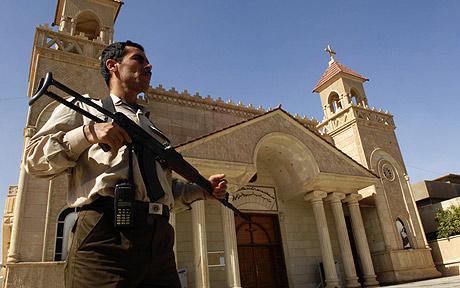Britain has forgotten its debt to the Christians of Iraq – by Kate Maltby
An armed man outside a cathedral in Kirkuk, Iraq. (Photo: AP)
“Nineveh city was a city of sin. The jazzin’ and a-jivin’ made a terrible din.” So starts Michael Hurd’s Jonah-Man Jazz, the Sixties incarnation of a long artistic tradition of celebrating the biblical Nineveh as a city of loose living. Sure, God sends the lugubrious Jonah to threaten the city with destruction if it doesn’t repent, but writers always prefer to focus on the fun than the moralising. Even the most apocalyptic of morality plays on the subject, Thomas Lodge and Robert Greene’s 1594 A Looking Glass for London and England, dwells with prurient fascination on the bed-swapping in Nineveh’s royal palace (incest! silken veils!) before the authors rather hastily remember they’re supposed to be warning sinful 16th-century London of what happens to corrupt cities.
But for the few Christians left in Nineveh Province today, it is the scriptural tradition of shriving and atonement that lingers in the mind, not the thought of parties. Three weeks before Ash Wednesday, Assyrian Christians observe the Fast of Nineveh, performing again the great penance of the biblical Ninevites. Their ancestors repented of hedonism, and God saved them: now, modern Ninevites do they same, and God has preserved them – until now. As Tim Stanley wrote on these pages last week, for the first time in 1,600 years, mass is not being said in Mosul, the modern capital of Nineveh Province. Christian women are raped in front of their husbands and fathers, holy sites desecrated, and the population offered a simple choice: convert, pay insupportable taxes, or die. In a grim echo of Europe’s Kristallnacht, the Arabic letter nun, for Nasrani (Christian), is daubed on the outside of Christian houses. As Dr Dwayne Menezes of the Humanitarian Intervention Centre tells me, “If anyone is seeking to understand what ethnic cleansing is, they will find in Mosul the archetypal case study”.
And to Assyrian Christians, it’s not only God who seems to have betrayed his covenant. The British government has a direct historical responsibility to the Assyrian Christians of Iraq. The use of local minorities as proxies for the British Empire is now well understood: few of us know, however, that in Iraq, Assyrian Christians were used at Britain’s peacekeeping force throughout the British mandate. The Iraq Levies, the first military unit created by the British in Iraq, were almost entirely manned by Assyrian Christians from its inception in 1920. The Islamists of Isis aren’t so forgetful – much of the violence against Christians in Iraq is shrugged off as just punishment for their collaboration with the British. In fact, revenge attacks against Assyrian Christians go long back – in 1933, the Iraqi army, boosted by Arab and Kurdish militants, celebrated the British withdrawal by massacring 3,000 Assyrians at Simele. Britain had long abandoned its promise of leaving a secure, autonomous Assyrian region behind them.
For politically active Assyrians, the answer is a home state, or semi-autonomous region within Iraq. For Mardean Isaac, who is, with the writer Nuri Kino, one of the organisers of a new campaign to defend Assyrian Christians, “we want to be understood as what we are: a people. We aren’t just a scattered collection of individuals across Middle Eastern states who happened to believe in Christianity.” One option, then, is international support for local attempts to re-establish security in an autonomous Nineveh Province. Given the stampede of Isis, and the anti-interventionist mood in the West, that seems unlikely. But if the West is serious about defending Christians, it needs to put pressure on the Kurds. As the Kurds look to build a new nation state, it will need the continued support of the West. So we must demand commitments by the Kurds that they will respect the autonomy of Assyrian communities within its borders. Securing local asylum matters: many of those fleeing the Simile massacre had been denied asylum by French Syria – we cannot allow the same cycle to occur again.
Of the 8,000 Assyrians living in Britain today, those over 50 were almost all born on RAF Habbaniya, the British military base, to parents serving the British. They are, like the Gurkhas, our people. They shouldn’t need Joanna Lumley to start waving a sword before we remember them.
Source:

